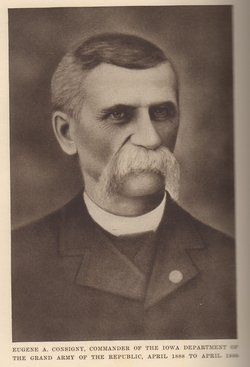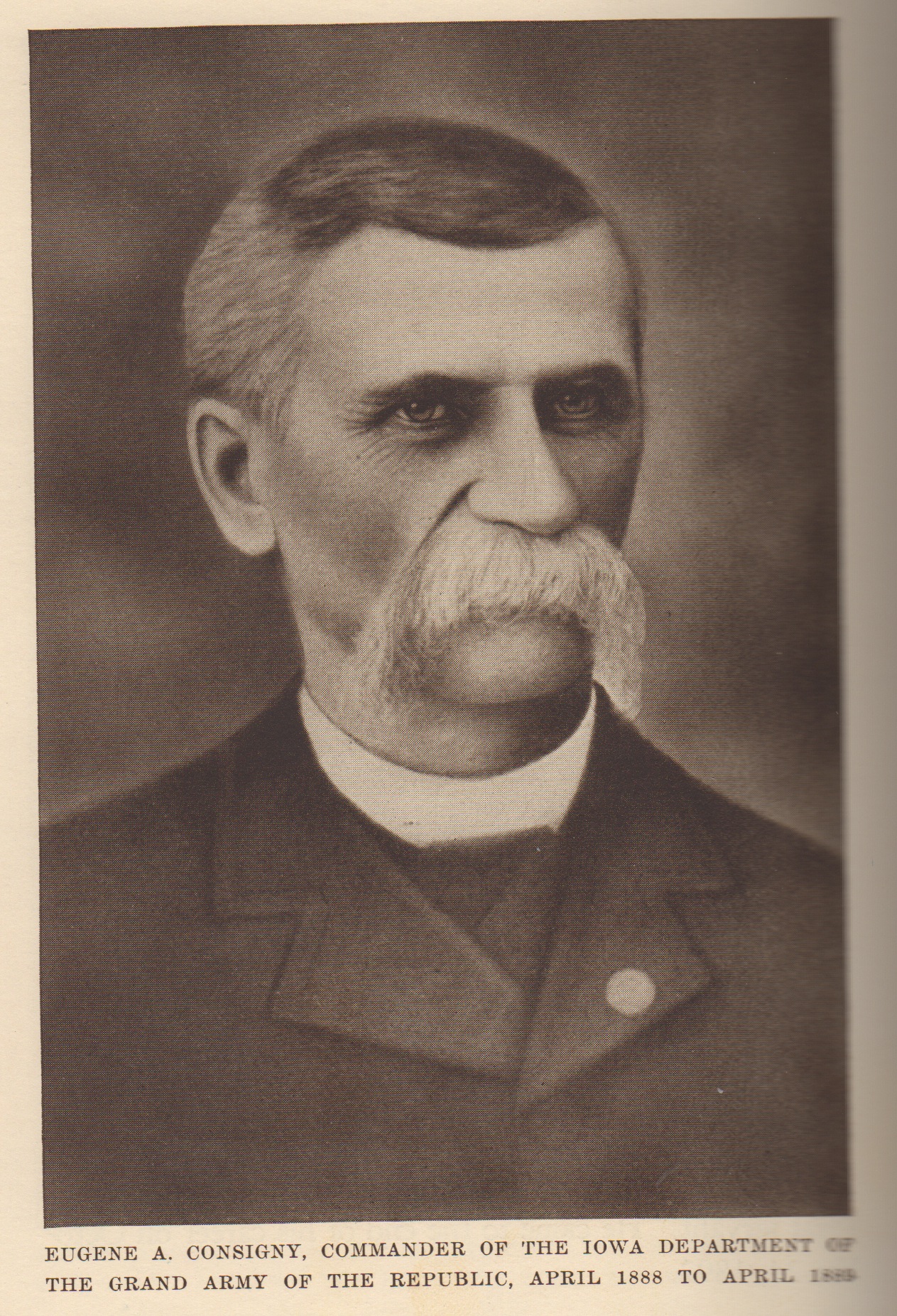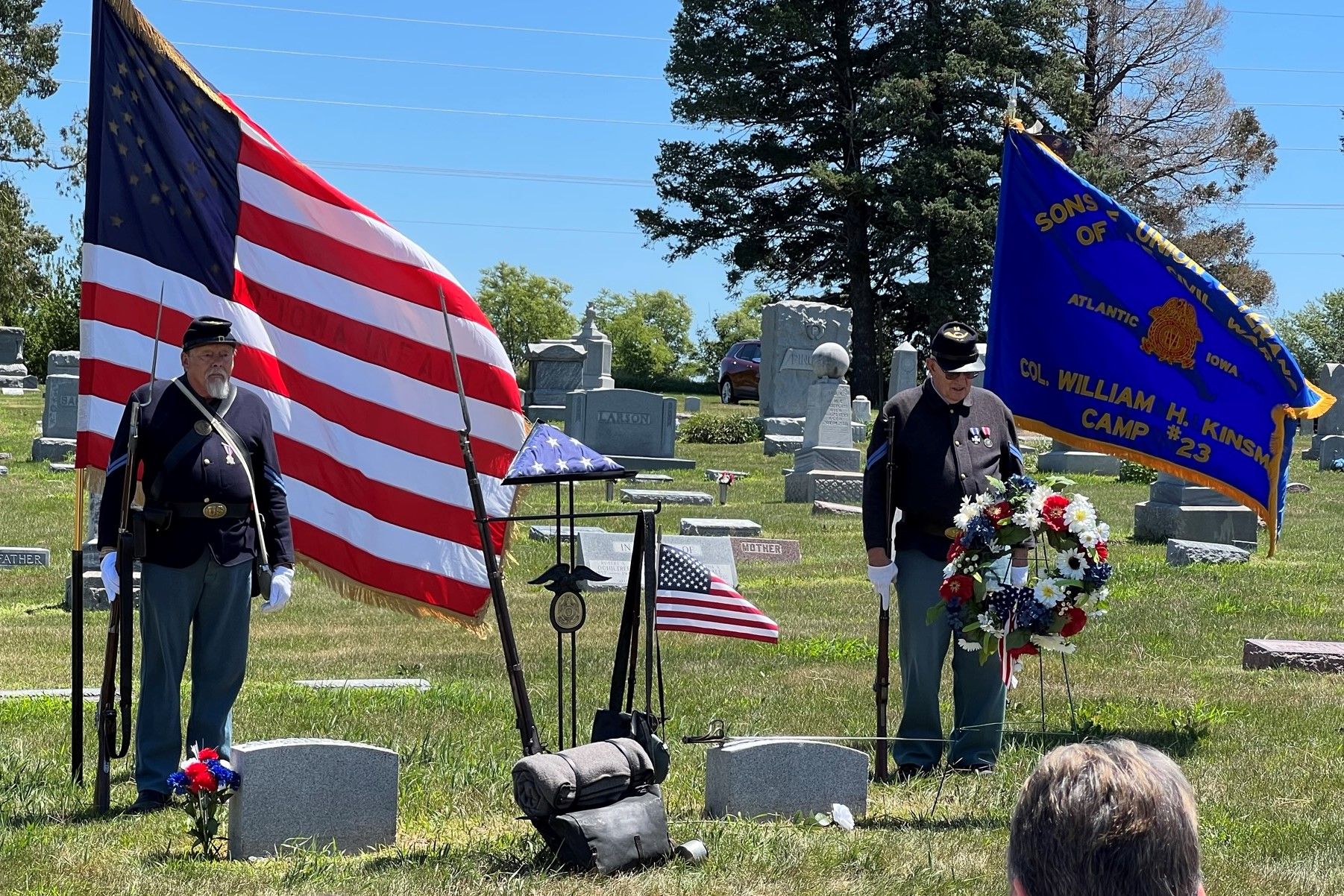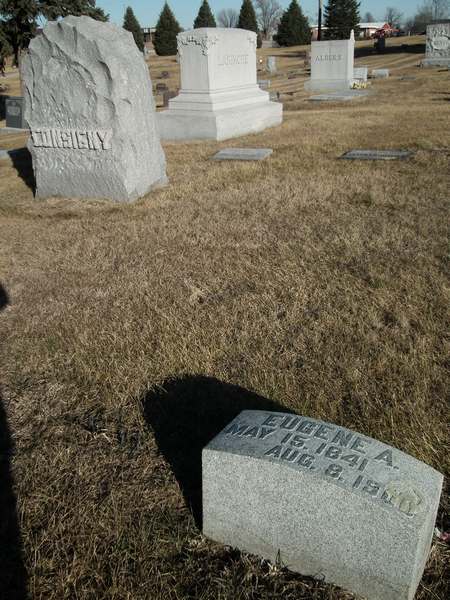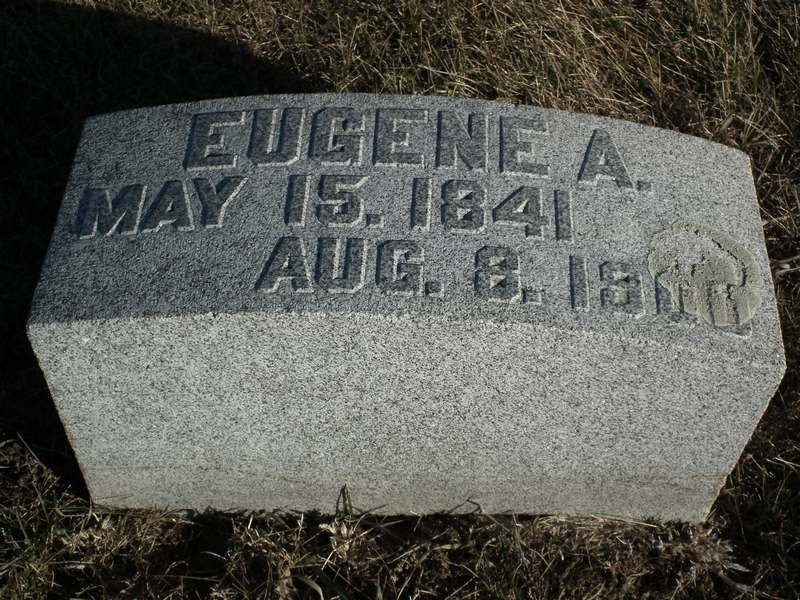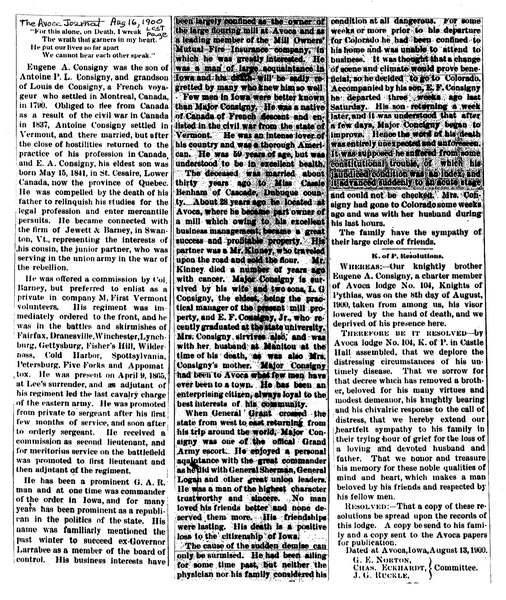(Photo & this Article from "The Iowa Department of the Grand Army of the Republic" compiled by Jacob A. Swisher. Published in 1936. Consigny was Commander in 1888-1889.)
EUGENE A. CONSIGNY
One of the soldiers who witnessed Lee's surrender at Appomattox, and one of the members of that magnificent host that marched up Pennsylvania Avenue at the close of the war was Eugene A. Consigny. Born on May 15, 1841, in what is now the province of Quebec, Canada, he moved at an early date to the State of Vermont, and during the second year of the Civil War he enlisted in the First Vermont Volunteer Cavalry. By virtue of his fine soldierly qualities and business ability he steadily advanced in rank until at the close of the war he was mustered out as adjutant with the rank of major. He was an active participant in many of the great battles of the war--Fairfax Courthouse, Lynchburg, Gettysburg, Wilderness, Cold Harbor, Petersburg, and Five Forks.
For a quarter of a century he was a resident of Iowa and a zealous worker in the interest of the Grand Army of the Republic. At the Fourteenth Annual Encampment held at Cedar Rapids in 1888 he was elected Department Commander--an office which he filled with honor and profit to the Department. For many years he was a prominent resident and business man--a dealer in grain and operator of mills--at Avoca in Pottawattamie County. It was at Manitou, Colorado, however, that he came to the end of his career, in August, 1900.
* * * * * * * * * *
(This detailed writeup for Eugene A. Consigny was taken from The Avoca Journal newspaper dated August 16, 1900 on page 8.)
E. A. CONSIGNY DEAD. Major E. A. Consigny, One of Avoca's Most Prominent Business Men, and Honored Veteran, Died at Manitou, Colorado. Services at Family Residence–He was Layed to Rest In the Avoca Cemetery by the Kind Hands of His Comrades and Fellow Citizens.
Making his exit from the mortal stage in Colorado, the body of him who had played a conspicuous part in the motley drama of life, was escorted to the train from the undertaking parlors at Colorado Springs, where a short service was held by the following well-known citizen of Iowa:
R. S. Hart and A. G. Vinton of Avoca; A. F. Conner of Colorado Springs; H. I. Forsyth, W. C. Unthank and Col. J. J. Stradman of Council Bluffs, and arrived at Avoca, Saturday evening, August 11, where it was met by the G.A.R. post and a large number of citizen.
Owing to the distance of many relatives and friends the obsequies were deferred until Tuesday, but immediately after the arrival of the body and until the hour of interment, floral offerings from neighbors and acquaintances began to flow in; some worked into devices expressing ideas of great beauty. The names of a few of the contributions are as follows:
A wreath of roses bore a card inscribed "The municipality to its former executive." The unbroken continuity of this trimmed circlet of roses was symbolic of unending memory.
An unstrung floral harp bore the card of "Mr. and Mrs. A. Edgington, Denver, Colorado." The frame of the harp was of roses and other flowers; the center was composed of white flowers for a background, upon which rested in darker color, in an elliptic, the words, "My Friend." Three pendant strings of emflax(?) were the unstrung chords. "It was a beautiful thought, and softly bodied forth," and, as contemplation gazed upon it, it served a fitting earthly symbol of him whom it sought to commemorate. {Included some poetry lines of Moore.}
A wreath, "At Rest," W. H. Schilling; wreath, Mr. and Mrs. Eggers and Ella Meitzen; floral tribute, Saturday Club emblem, K. of P.; pillow "Brother," brothers of deceased; pillow, "Father," two sons; cross, K. W. Davis; pillow, H. A. R. Flowers were also received from the following friends:
Mr. and Mrs. Emmert, Mr. and Mrs. Hall, Mr. and Mrs. Steadman, Mr. and Mrs. Davis, Misses Larimore, Mr. and Mrs. Cady and Mr. and Mrs. Wheeler of Omaha, Miss Maier, Mrs. Buck, Ethel Blanchard, Miss Franz, Miss Hetzel, Mr. and Mrs. Duke, "Sigma Nu Fraternity."
At 1:15 p.m. Tuesday a procession was formed at the court house in the following order:
Avoca Band, City Council, Fire Department, Knights of Pythius, soldiers of Spanish war, delegations of Grand Army posts from Walnut, Oakland, Harlan and Shelby, to the number of about one hundred, Avoca post, concourse of citizens.
The family residence was reached at 2 o'clock, where the services inside were conducted by Rev. J. L. Blanchard of Colorado, and the instrumental music rendered by Miss Maud Larimore, assisted vocally by the Presbyterian church choir, consisting of W. W. Gardner, Dr. Maxwell, Miss Carrie Slade and Miss Mabel Larimore.
Judge Given was expected, but was unavoidably delayed until it was too late to get here.
Hon. Lafayette Young, erstwhile senator from Cass county, but now editor of the Daily Capitol at Des Moines, delivered an address from the porch to those on the lawn, in eulogy of the deceased, from the standpoint of an intimate friend.
It is needless to say that the obsequies were attended by a larger number of people than Avoca has ever before witnessed.
The Saturday Club, of which Mrs. Consigny was a former president, attended in a body, and were placed in immediately behind the family in the cortege which slowly wended its way to the subdued strains of solemn music, to the city on the hill, "where each must take his chamber in the silent halls of death."
The procession to the cemetery was arranged in about the same order as the one from the court house to the residence, both under the supervision of J. M. Long and his efficient military aid, Captain Sterling.
In the ceremony at the grave, General Davis of Sioux City, present commander of the G.A.R. of Iowa, and assistant adjutant Newman of Des Moines, assisted the local post in consigning their past commander to earth.
The Knights of Pythius read their rituals for the dead; the choir sang a solemn dirge, and Rev. Morach uttered a prayer, and so the ceremonies which marked the mortal close of the career of a useful citizen were ended. Along the varied paths of life in which he trod, civil, commercial, social and political, he will long be missed.
Eugene A. Consigny was the son of Antoine P. L. Consigny, and grandson of Louis de Consigny, a French voyageur who settled in Montreal, Canada, in 1790. Obliged to flee from Canada as a result of the civil war in Canada in 1837, Antoine Consigny settled in Vermont, and there married, but after the close of hostilities returned to the practice of his profession in Canada, and E. A. Consigny, his eldest son was born May 15, 1841, in St. Cesaire, Lower Canada, now the province of Quebec. He was compelled by the death of his father to relinquish his studies for the legal profession and enter mercantile pursuits. He became connected with the firm of Jewett & Barney in Swanton, Vermont, representing the interests of his cousin, the junior partner, who was serving in the union army in the war of the rebellion.
He was offered a commission by Col. Barney, but preferred to enlist as a private in Company M, First Vermont volunteers. His regiment was immediately ordered to the front, and he was in the battles and skirmishes of Fairfax, Dranesville, Winchester, Lynchburg, Gettysburg, Fisher's Hill, Wilderness, Cold Harbor, Spotsyl-vania, Petersburg, Five Forks and Appomattox. He was present on April 9, 1865 at Lee's surrender, and as adjutant of his regiment led the last cavalry charge of the eastern army. He was promoted from private to sergeant after his first few months of service, and soon after to orderly sergeant. He received a commission as second lieutenant, and for meritorious service on the battlefield was promoted to first lieutenant and then adjutant of the regiment.
He has been a prominent G.A.R. man and at one time was commander of the order in Iowa, and for many years has been prominent as a republican in the politics of the state. His name was familiarly mentioned the past winter to succeed ex-Governor Larrabee as a member of the board of control. His business interests have been largely confined as the owner of the large flouring mill at Avoca and as a leading member of the Mill Owners' Mutual Fire Insurance company, in which he was greatly interested. He was a man of large acquaintance in Iowa and his death will be sadly regretted by many who knew him so well.
Few men in Iowa were better known than Major Consigny. He was a native of Canada of French descent and enlisted in the civil war from the state of Vermont. He was an intense lover of his country and was a thorough American. He was 59 years of age, but was understood to be in excellent health.
The deceased was married about thirty years ago to Miss Cassie Benham of Cascade, Dubuque county. About 28 years ago he located at Avoca, where he became part owner of a mill which owing to his excellent business management, became a great success and profitable property. His partner was a Mr. Kinney, who traveled upon the road and sold the flour. Mr. Kinney died a number of years ago with cancer. Major Consigny is survived by his wife and two sons, L. G. Consigny, the oldest, being the practical manager of the present mill property, and E. F. Consigny, Jr., who recently graduated at the state university. Mrs. Consigny, survives also, and was with her husband at Manitou at the time of his death, as was also Mrs. Consigny's mother. Major Consigny had been to Avoca when few men have ever been to a town. He has been an enterprising citizen, always loyal to the best interests of his community.
When General Grant crossed the state from west to east returning from his trip around the world, Major Consigny was one of the official Grand Army escort. He enjoyed a personal acquaintance with the great commander as he did with General Sherman, General Logan and other great union leaders. He was a man of the highest character, trustworthy and sincere. No man loved his friends better and none deserved them more. His friendships were lasting. His death is a positive loss to the citizenship of Iowa.
The cause of the sudden demise can only be surmised. He had been ailing for some time past, but neither the physician nor his family considered his condition at all dangerous. For some weeks or more prior to his departure for Colorado he had been confined to his home and was unable to attend to business. It was thought that a change of scene and climate would prove beneficial, so he decided to go to Colorado. Accompanied by his son, E. F. Consigny he departed three weeks ago last Saturday. His son returning a week later, and it was understood that after a few days, Major Consigny began to improve. Hence the word of his death was entirely unexpected, and unforeseen. It was supposed he suffered from some constitutional trouble, of which his jaundiced condition was an index, and it advanced suddenly to an acute stage and could not be checked. Mrs. Consigny had gone to Colorado some weeks ago and was with her husband during his last hours.
The family have the sympathy of their large circle of friends.
(Photo & this Article from "The Iowa Department of the Grand Army of the Republic" compiled by Jacob A. Swisher. Published in 1936. Consigny was Commander in 1888-1889.)
EUGENE A. CONSIGNY
One of the soldiers who witnessed Lee's surrender at Appomattox, and one of the members of that magnificent host that marched up Pennsylvania Avenue at the close of the war was Eugene A. Consigny. Born on May 15, 1841, in what is now the province of Quebec, Canada, he moved at an early date to the State of Vermont, and during the second year of the Civil War he enlisted in the First Vermont Volunteer Cavalry. By virtue of his fine soldierly qualities and business ability he steadily advanced in rank until at the close of the war he was mustered out as adjutant with the rank of major. He was an active participant in many of the great battles of the war--Fairfax Courthouse, Lynchburg, Gettysburg, Wilderness, Cold Harbor, Petersburg, and Five Forks.
For a quarter of a century he was a resident of Iowa and a zealous worker in the interest of the Grand Army of the Republic. At the Fourteenth Annual Encampment held at Cedar Rapids in 1888 he was elected Department Commander--an office which he filled with honor and profit to the Department. For many years he was a prominent resident and business man--a dealer in grain and operator of mills--at Avoca in Pottawattamie County. It was at Manitou, Colorado, however, that he came to the end of his career, in August, 1900.
* * * * * * * * * *
(This detailed writeup for Eugene A. Consigny was taken from The Avoca Journal newspaper dated August 16, 1900 on page 8.)
E. A. CONSIGNY DEAD. Major E. A. Consigny, One of Avoca's Most Prominent Business Men, and Honored Veteran, Died at Manitou, Colorado. Services at Family Residence–He was Layed to Rest In the Avoca Cemetery by the Kind Hands of His Comrades and Fellow Citizens.
Making his exit from the mortal stage in Colorado, the body of him who had played a conspicuous part in the motley drama of life, was escorted to the train from the undertaking parlors at Colorado Springs, where a short service was held by the following well-known citizen of Iowa:
R. S. Hart and A. G. Vinton of Avoca; A. F. Conner of Colorado Springs; H. I. Forsyth, W. C. Unthank and Col. J. J. Stradman of Council Bluffs, and arrived at Avoca, Saturday evening, August 11, where it was met by the G.A.R. post and a large number of citizen.
Owing to the distance of many relatives and friends the obsequies were deferred until Tuesday, but immediately after the arrival of the body and until the hour of interment, floral offerings from neighbors and acquaintances began to flow in; some worked into devices expressing ideas of great beauty. The names of a few of the contributions are as follows:
A wreath of roses bore a card inscribed "The municipality to its former executive." The unbroken continuity of this trimmed circlet of roses was symbolic of unending memory.
An unstrung floral harp bore the card of "Mr. and Mrs. A. Edgington, Denver, Colorado." The frame of the harp was of roses and other flowers; the center was composed of white flowers for a background, upon which rested in darker color, in an elliptic, the words, "My Friend." Three pendant strings of emflax(?) were the unstrung chords. "It was a beautiful thought, and softly bodied forth," and, as contemplation gazed upon it, it served a fitting earthly symbol of him whom it sought to commemorate. {Included some poetry lines of Moore.}
A wreath, "At Rest," W. H. Schilling; wreath, Mr. and Mrs. Eggers and Ella Meitzen; floral tribute, Saturday Club emblem, K. of P.; pillow "Brother," brothers of deceased; pillow, "Father," two sons; cross, K. W. Davis; pillow, H. A. R. Flowers were also received from the following friends:
Mr. and Mrs. Emmert, Mr. and Mrs. Hall, Mr. and Mrs. Steadman, Mr. and Mrs. Davis, Misses Larimore, Mr. and Mrs. Cady and Mr. and Mrs. Wheeler of Omaha, Miss Maier, Mrs. Buck, Ethel Blanchard, Miss Franz, Miss Hetzel, Mr. and Mrs. Duke, "Sigma Nu Fraternity."
At 1:15 p.m. Tuesday a procession was formed at the court house in the following order:
Avoca Band, City Council, Fire Department, Knights of Pythius, soldiers of Spanish war, delegations of Grand Army posts from Walnut, Oakland, Harlan and Shelby, to the number of about one hundred, Avoca post, concourse of citizens.
The family residence was reached at 2 o'clock, where the services inside were conducted by Rev. J. L. Blanchard of Colorado, and the instrumental music rendered by Miss Maud Larimore, assisted vocally by the Presbyterian church choir, consisting of W. W. Gardner, Dr. Maxwell, Miss Carrie Slade and Miss Mabel Larimore.
Judge Given was expected, but was unavoidably delayed until it was too late to get here.
Hon. Lafayette Young, erstwhile senator from Cass county, but now editor of the Daily Capitol at Des Moines, delivered an address from the porch to those on the lawn, in eulogy of the deceased, from the standpoint of an intimate friend.
It is needless to say that the obsequies were attended by a larger number of people than Avoca has ever before witnessed.
The Saturday Club, of which Mrs. Consigny was a former president, attended in a body, and were placed in immediately behind the family in the cortege which slowly wended its way to the subdued strains of solemn music, to the city on the hill, "where each must take his chamber in the silent halls of death."
The procession to the cemetery was arranged in about the same order as the one from the court house to the residence, both under the supervision of J. M. Long and his efficient military aid, Captain Sterling.
In the ceremony at the grave, General Davis of Sioux City, present commander of the G.A.R. of Iowa, and assistant adjutant Newman of Des Moines, assisted the local post in consigning their past commander to earth.
The Knights of Pythius read their rituals for the dead; the choir sang a solemn dirge, and Rev. Morach uttered a prayer, and so the ceremonies which marked the mortal close of the career of a useful citizen were ended. Along the varied paths of life in which he trod, civil, commercial, social and political, he will long be missed.
Eugene A. Consigny was the son of Antoine P. L. Consigny, and grandson of Louis de Consigny, a French voyageur who settled in Montreal, Canada, in 1790. Obliged to flee from Canada as a result of the civil war in Canada in 1837, Antoine Consigny settled in Vermont, and there married, but after the close of hostilities returned to the practice of his profession in Canada, and E. A. Consigny, his eldest son was born May 15, 1841, in St. Cesaire, Lower Canada, now the province of Quebec. He was compelled by the death of his father to relinquish his studies for the legal profession and enter mercantile pursuits. He became connected with the firm of Jewett & Barney in Swanton, Vermont, representing the interests of his cousin, the junior partner, who was serving in the union army in the war of the rebellion.
He was offered a commission by Col. Barney, but preferred to enlist as a private in Company M, First Vermont volunteers. His regiment was immediately ordered to the front, and he was in the battles and skirmishes of Fairfax, Dranesville, Winchester, Lynchburg, Gettysburg, Fisher's Hill, Wilderness, Cold Harbor, Spotsyl-vania, Petersburg, Five Forks and Appomattox. He was present on April 9, 1865 at Lee's surrender, and as adjutant of his regiment led the last cavalry charge of the eastern army. He was promoted from private to sergeant after his first few months of service, and soon after to orderly sergeant. He received a commission as second lieutenant, and for meritorious service on the battlefield was promoted to first lieutenant and then adjutant of the regiment.
He has been a prominent G.A.R. man and at one time was commander of the order in Iowa, and for many years has been prominent as a republican in the politics of the state. His name was familiarly mentioned the past winter to succeed ex-Governor Larrabee as a member of the board of control. His business interests have been largely confined as the owner of the large flouring mill at Avoca and as a leading member of the Mill Owners' Mutual Fire Insurance company, in which he was greatly interested. He was a man of large acquaintance in Iowa and his death will be sadly regretted by many who knew him so well.
Few men in Iowa were better known than Major Consigny. He was a native of Canada of French descent and enlisted in the civil war from the state of Vermont. He was an intense lover of his country and was a thorough American. He was 59 years of age, but was understood to be in excellent health.
The deceased was married about thirty years ago to Miss Cassie Benham of Cascade, Dubuque county. About 28 years ago he located at Avoca, where he became part owner of a mill which owing to his excellent business management, became a great success and profitable property. His partner was a Mr. Kinney, who traveled upon the road and sold the flour. Mr. Kinney died a number of years ago with cancer. Major Consigny is survived by his wife and two sons, L. G. Consigny, the oldest, being the practical manager of the present mill property, and E. F. Consigny, Jr., who recently graduated at the state university. Mrs. Consigny, survives also, and was with her husband at Manitou at the time of his death, as was also Mrs. Consigny's mother. Major Consigny had been to Avoca when few men have ever been to a town. He has been an enterprising citizen, always loyal to the best interests of his community.
When General Grant crossed the state from west to east returning from his trip around the world, Major Consigny was one of the official Grand Army escort. He enjoyed a personal acquaintance with the great commander as he did with General Sherman, General Logan and other great union leaders. He was a man of the highest character, trustworthy and sincere. No man loved his friends better and none deserved them more. His friendships were lasting. His death is a positive loss to the citizenship of Iowa.
The cause of the sudden demise can only be surmised. He had been ailing for some time past, but neither the physician nor his family considered his condition at all dangerous. For some weeks or more prior to his departure for Colorado he had been confined to his home and was unable to attend to business. It was thought that a change of scene and climate would prove beneficial, so he decided to go to Colorado. Accompanied by his son, E. F. Consigny he departed three weeks ago last Saturday. His son returning a week later, and it was understood that after a few days, Major Consigny began to improve. Hence the word of his death was entirely unexpected, and unforeseen. It was supposed he suffered from some constitutional trouble, of which his jaundiced condition was an index, and it advanced suddenly to an acute stage and could not be checked. Mrs. Consigny had gone to Colorado some weeks ago and was with her husband during his last hours.
The family have the sympathy of their large circle of friends.
Family Members
Sponsored by Ancestry
Advertisement
Records on Ancestry
Advertisement
